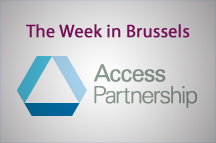 The leading news items from Brussels this week perfectly encapsulate the “carrot and stick” nature of the European Union. On the one hand, the Commission has trumpeted news that – after nearly ten years of painstaking negotiations with member states and network operators – roaming surcharges have been abolished for EU citizens. Users will now be able to call, text and browse the Internet across the EU at the same charge as their standard plan. This is the EU at its best: bringing down barriers, driving commerce and cultural exchange across the bloc. While celebrating, spare a thought for British holidaymakers who will be able to roam like at home this summer and next, but may see those privileges withdrawn in 2019 if not included in the Brexit deal.
The leading news items from Brussels this week perfectly encapsulate the “carrot and stick” nature of the European Union. On the one hand, the Commission has trumpeted news that – after nearly ten years of painstaking negotiations with member states and network operators – roaming surcharges have been abolished for EU citizens. Users will now be able to call, text and browse the Internet across the EU at the same charge as their standard plan. This is the EU at its best: bringing down barriers, driving commerce and cultural exchange across the bloc. While celebrating, spare a thought for British holidaymakers who will be able to roam like at home this summer and next, but may see those privileges withdrawn in 2019 if not included in the Brexit deal.
So much for the carrot, but what about the stick? At Wednesday’s weekly College meeting, Commissioners signed off on an infringement package against the Czech Republic, Hungary and Poland for non-compliance with their obligations under the 2015 Council Decisions on the relocation of refugees. Shockingly, the Visegrad countries have not made any effort to comply with the resettlement programme so far and have not made any pledges to rectify this in the future. Continued non-compliance with the resettlement scheme will result in the withdrawal of EU subsidies for the countries in question.
Plenary wrap up
 MEPs decamped to Strasbourg this week for the plenary session of Parliament. In familiar form, Belgian liberal MEP Guy Verhofstadt used the opportunity to grandstand. Verhofstadt is the Parliament’s chief Brexit negotiator and a famed self-publicist. On Wednesday, he took to the airwaves to goad UK Brexit negotiators, demanding they answer a number of pressing questions on the UK’s Brexit stance, before flirting with the possibility of the UK aborting the Brexit process. Verhofstadt’s key message for the UK was that while the door was always open for the UK to re-join the club, the EU itself had changed as a result of Brexit and the UK would find it more united and more integrated than before.
MEPs decamped to Strasbourg this week for the plenary session of Parliament. In familiar form, Belgian liberal MEP Guy Verhofstadt used the opportunity to grandstand. Verhofstadt is the Parliament’s chief Brexit negotiator and a famed self-publicist. On Wednesday, he took to the airwaves to goad UK Brexit negotiators, demanding they answer a number of pressing questions on the UK’s Brexit stance, before flirting with the possibility of the UK aborting the Brexit process. Verhofstadt’s key message for the UK was that while the door was always open for the UK to re-join the club, the EU itself had changed as a result of Brexit and the UK would find it more united and more integrated than before.
Other highlights on the plenary agenda included a debate and vote on the challenges of the “collaborative” or “sharing” economy, including fair competition, workers’ rights and tax compliance, and the role of online platforms in fighting the spread of fake news, in two separate non-binding resolutions.
Digital Assembly in Valetta
To round off the week, Commission officials, MEPs, tech policy wonks and lobbyists jetted to Valetta, Malta for the annual Digital Assembly, jointly organised by DG Connect and the Maltese Presidency of the Council of the European Union. The Commission didn’t miss the opportunity to herald the abolition of roaming surcharges as a key pillar of the digital single market. Given the ten years it took to negotiate this legislation, the assembled dignitaries will probably need all the enthusiasm they can muster for the long nights ahead working through weighty files on copyright, telecoms and broadcasting rules…
It’s back to Brussels next week, with committee and group meetings planned. We’ll be getting stuck into the draft report on the ePrivacy Regulation prepared by the Parliament’s rapporteur, Marju Lauristin MEP. The report takes a strong pro-privacy stance and is likely to dismay the tech industry but delight civil liberties campaigners.














